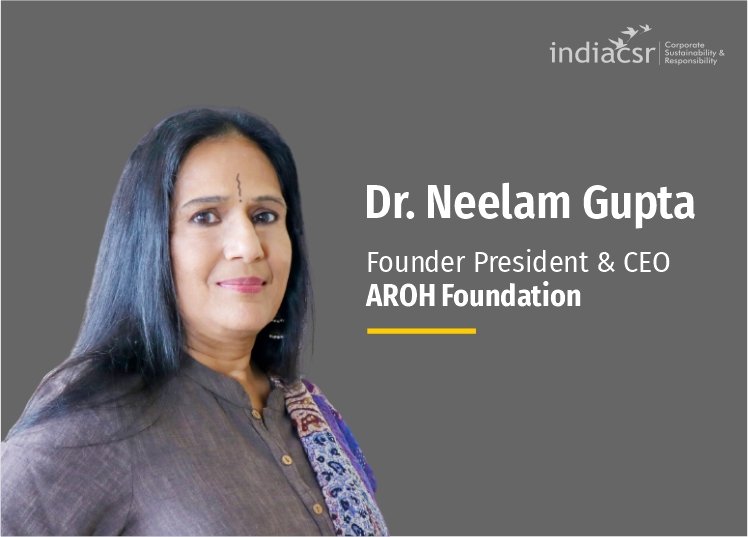AROH endeavors for holistic development of villages in Baran, Rajasthan with LIC Housing and Finance Ltd.
The beautiful state of Rajasthan is situated in the northern part of India. It is endowed with a rich cultural heritage and attractive natural diversity. Rajasthan means “The Land of Kings”. Home to almost 6.89 crores people (as per census 2012), the economy is mostly dependent on agricultural and pastoral grounds. Added benefits like being the biggest hub of oil and oilseeds, wool, opium, second largest producer of poly fiber, sandstones, handicrafts, etc. have indeed gifted Rajasthan for being a self-sustaining and market ruling diversified resource. Baran district in Rajasthan is situated at around 339 km from state capital Jaipur.
The district is also abundantly gifted with resources. The annual rainfall in the district is 457.6 cm. Irrigation is done through tube wells, wells, and ponds. The economy is based on agriculture and its auxiliary products There are about 2,26,504 cultivators. They produce wheat, rice, jowar, maize, gram, groundnut, coriander, soyabean, bajara, barley, garlic, etc.
From an agricultural point of view, Baran District has its own identity. The rivers passing through the district are Kalisindh, Parvati, Parvan which originate from Madhya Pradesh. 72.66% of the working force engaged in the agricultural sector. Agriculture sectors provide 32.85% of the livelihood of the total population of the district.
Rajasthan is widely referred to as the desert state of India, but district like Baran has sufficient natural resources to meet people’s economic, agricultures and cultural needs. Although a hub to many resources in terms of trade, minerals, handicrafts and agriculture, yet the region’s potential is left untapped, mismanaged, and not properly linked. Projects like Parwan, commissioned in 2008 to solve the drinking water and irrigation water needs of Baran are still not completed. Baran’s Sahariya Tribe is the most backward and deprived community in the state, still living in thatched huts, living as daily wagers in Baran, or forced to migrate to some other state as labourers.
Thanks to the lackluster approach of government and coupled with the lethargy of policymakers till now. In a gist, it could be said that a lot of potentials was getting wasted without a team and a plan.
Recognizing the urgent need to intervene and create a conducive environment within various stakeholders towards holistic development of villages and villagers, AROH Foundation, in partnership with LIC Housing and Finance limited flagged off Holistic Rural Development project ‘Hriday’ for 7 villages in Antah block in Baran.
AROH Foundation has been implementing Holistic Rural Development Projects in more than 60 remotest villages in Chhattisgarh, Meghalaya, and Uttar Pradesh for the past 7 – 8 years. AROH stands as a leading expert in terms of vast Holistic Rural Development project implementation and evaluation. Encouraged by the success and impact of the project in transforming rural lives in the past, the resource pool has been allocated in 7 more villages of Baran.
The project aims to develop adopted villages into self-sustaining revenue models through multi-sectoral interventions, ensure access to basic amenities of Safe Water, Sanitation and Clean Energy and positively impact the lives of around 9250 people, upgrading their socio-economic and cultural stature. The project shall have its crux to upgrade and renovate existing resources rather than placing a new one in the system.
Besides bringing a positive transformation in people’s lives, the project also serves as an additional step towards the achievement of UN Sustainable Development Goals and facilitating Indian Government in the national agenda of ‘Suvidha Shehar ki ho aur Aatma Gaanv ki’ (facilities of a city with an essence of a village).
With a panel of experts pre-assessing the challenges, opportunities, and mitigation strategy, the focus of the program shall be on raising the living standards of the rural hinterland through infrastructural investment and human development & building local enterprise towards faster economic growth and poverty alleviation.
This shall include formation and handholding of Farmer Producers Organization, Self Help Groups, Enterprise and Entrepreneur development, Adoption and up-gradation of Aanganwadis and Government schools, Access to Safe Water, Sanitation and Energy, Advocacy and mass awareness campaigns, etc.

Speaking further about the ambitious project, Dr. Neelam Gupta, Founder President and CEO of AROH Foundation says, “Rural development is not entirely a new concept; it existed in India since Vedic times. We have seen how planned development in Indus Valley or Harrapan Civilization has given them prosperity and longevity of growth. The same is the need of the hour. Thoughtful alliance of Plan, People and Policy Makers is what we need to have sustainable development in the villages. For a resource-rich state like Rajasthan, if we want sustainable development, we must start with our villages, because the roads that lead to cities pass through villages. They have the heart for economy, culture and change. But the same needs to be done with an agenda to rejuvenate and renovate the existing resources and not exploit them. When we move towards making our villages smart and self-sufficient, we will reduce the burden of migration in cities. This is a replicable concept. All it requires is intent and financial support. And with ‘Hriday’, as the name itself suggests, we have all our heart to make it happen.”
(India CSR)







